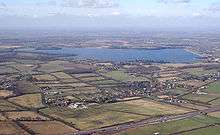Hanningfield Reservoir
Hanningfield Reservoir is a 402.9 hectare biological Site of Special Scientific Interest between Billericay and Chelmsford in Essex. It is owned by Essex and Suffolk Water and run by them in conjunction with the Essex Wildlife Trust. The reservoir is covered by a Bird Sanctuary Order.[1][2][3]
| Site of Special Scientific Interest | |
 | |
| Area of Search | Essex |
|---|---|
| Grid reference | TQ 730980 |
| Interest | Biological |
| Area | 402.9 ha (996 acres) |
| Notification | 1985 |
| Location map | Magic Map |
| Hanningfield Reservoir | |
|---|---|
.jpg) | |
| Location | Essex |
| Coordinates | 51°39′30″N 0°30′15″E |
| Type | reservoir |
| Basin countries | United Kingdom |
| Max. width | 3.25 km (2.02 mi) |
| Average depth | 7.62 m (25.0 ft) |
| Max. depth | 16.76 m (55.0 ft) |
| Shore length1 | 6 mi (9.7 km) |
| Surface elevation | 55 m (180 ft) |
| 1 Shore length is not a well-defined measure. | |
Description
The reservoir is the 11th largest reservoir in England with an area of 3.5 square kilometres (880 acres). The reservoir was formed by W. & C. French in 1957[4] at a cost of about £6m, by flooding an area of South Hanningfield covering the ancient hamlet of Peasdown. Giffords Farm and Fremnells Manor were also flooded. The reservoir was built in an area formerly known as Sandon Valley, and large parts of the reservoir and surrounding countryside have been developed as a nature reserve. There are many footpaths in the woodland around the water where wildlife can be seen, and hides have been erected, with views of the visiting and resident birds. The public can use the reservoir for seasonal fly fishing both from the bank and from boats, providing a fishing permit is bought in advance. The water is regularly stocked with rainbow trout; the heaviest fish ever caught, in 1998, weighed 24 lb 1oz (10.9 kg).[4]
There are two cafés at each end of the reservoir: the newer, opened in 2007, is next to the fishing lodge with a deck overlooking the water, and the other is at the Essex Wildlife Trust visitors' centre.[5]
Wildlife
The reservoir has a nationally important population of gadwalls, and it also has significant numbers of pochards, teal, tufted ducks and pintails. The chalk sludge lagoon has several unusual plants, including golden dock and marsh dock, and there is a rare moss Brachythecium mildeanum at the foot of the southern dam.[1]
References
- "Hanningfield Reservoir citation" (PDF). Sites of Special Scientific Interest. Natural England. Retrieved 1 August 2016.
- "Map of Hanningfield Reservoir". Sites of Special Scientific Interest. Natural England. Retrieved 1 August 2016.
- "Hanningfield Reservoir Visitor Centre". Essex Wildlife Trust. Retrieved 1 August 2016.
- "Hanningfield Facts". Essex & Suffolk Water. Archived from the original on 25 July 2008.
-
- "Hanningfield Reservoir". Essex Wildlife Trust. Archived from the original on 12 January 2013.
External links
| Wikimedia Commons has media related to Hanningfield Reservoir. |